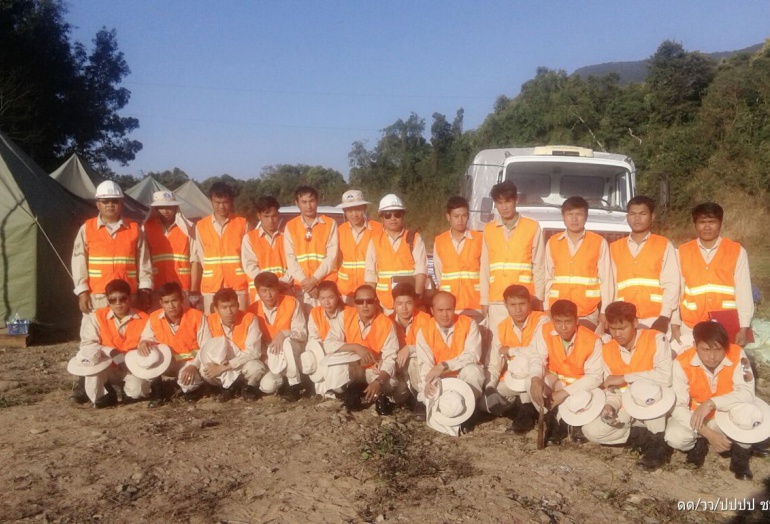The Rural Infrastructure Programme (RIP) is a Lao-German Financial Cooperation programme, which is implemented in Phases as an “open programme” with the Ministry of Public Works and Transport (MPWT) as the Programme Executing Agency (PEA). RIP Phase VI phase aims to assist the GoL in rehabilitation of rural roads and associated bridges, and other infrastructure in Salavanh Province, supporting maintenance and climate adaptation measures on local roads previously improved under RIP in the Northern provinces of Bokeo, Luang Namtha and Oudomxai, and for Training and Capacity Building Measures which cover the new province of Salavanh, all previous RIP Provinces, and the PTTC in Vientiane. The project objective of RIP VI is “Sustainable utilisation of the improved rural roads and other infrastructure throughout the year”. RIP VI is composed of four Components:
The achievement of the project objective will be measured by direct and indirect indicators.
The total RIP VI contribution of the FRG through KfW is EUR 16.8 million, while the Lao Government has allocated an equivalent of approximately EUR 3.0 million as contribution of approximately 15% of the total project cost.
Services Provided
The scope of work of the consulting services under the Investment Measures Component (IMC) and under the Training Measure (TM / AMC) comprises the following tasks:
PREPARATION AND INCEPTION
- General inventories, update information from PPS,
- Review road selection and dimensions of structures
- Re-assessment of mines and UXO clearance situation in Samouay and Ta-Oy Districts of Salavanh
- Re-assessment of the design of market improvements and bus stations
- Preliminary determination of contract packages;
- Inception Report, final list of roads and buildings
ENGINEERING DESIGN & PLANNING
- Field investigations and engineering surveys for roads in Salavanh, and for maintenance and climate adaptation measures in the previous provinces
- UXO clearing in Salavanh, parallel to the field surveys
- Road, bridge, drainage structure and building design, and preparation of technical specifications and tender documents
- Sub-soil and hydraulic investigations for bridges and drainage structures in Salavanh
- Environmental impact screening/ initial environmental evaluation/ impact assessment and monitoring schedule for environmental safeguards
- Ensuring adaptation of the designs to anticipated climate change, climate proofing according to KfW guidelines
- Final definition of contract packages, preparation of engineer's cost estimates
- Preparation of design reports
ASSISTANCE TO DPWTS IN TENDERING
- Preparation of bidding documents for both NCB and ICB
- Tendering of civil works and of equipment supply
- Bid evaluation, contract negotiations, award of contracts and contract documentation
SUPERVISION OF CONSTRUCTION & CONTRACT ADMINISTRATION
- Contractors' mobilization and site establishment
- Design review and support;
- Construction supervision, quality control & assurance
- Measurement, contract administration, and financial control;
- Assist in Simplified Direct Disbursement Procedures for NCB and ICB contracts, including preparation of Payment Certificates and Withdrawal Applications
- Monitoring and update of overall project status and budget (LOGAS);
- Adherence to environmental and social requirements
- Evaluation of claims & time extensions, settlement of disputes
- Liaison, site meetings and coordination with Employer, Contractors and other authorities
- Certification and handing over of completed works;
- Organisation of the monitoring of the defect liability period, inspection of rectification of defects during defects liability period, final accounts and certification
- Delivery of on-site coaching, on-the-job training and guidance to contractors
- Preparation and supervision of implementation of HIV/AIDS Awareness Raising Campaigns along project roads (with the help of local NGOs).
PROCUREMENT OF VEHICLES AND SPECIAL EQUIPMENT
- Review procurement lists and adjust where necessary
- Carry out procurement in line with KfW and MPWT procurement rules
- Monitor commissioning by supplier and ensure proper training of DPWT/OPWT staff in use of equipment
SOCIO-ECONOMIC IMPACT MONITORING
- Review of previous RIP baseline indicators and establishment of baseline indicators for socio-economic and environmental impact of RIP VI, under due consideration of the results matrix;
- Baseline study before the start of physical works and post-construction survey towards the end of the project
- Comparison of developments with and without project through monitoring of developments along control road(s)
- Prepare draft ToR and tender documentation for ex-post survey 2 - 3 years after project completion;
CLIMATE CHANGE, ENVIRONMENTAL AND OTHER SAFEGUARDS
- Climate change screening for selected measures according to KfW Guidelines
- Evaluation of manifestation of climate change risks like influence of monsoon, shorter and more intensive rainfalls, inundations, extension of heat and dry periods.
- Consider probable and foreseeable consequences of climate change over a period of approximately 20 years
- Include adaptation measures in the final design, anticipating likely climate change impacts
- Minimize negative environmental effects and impact
- Monitor adverse impacts on communities, minimise involuntary resettlement and land acquisition, and mitigate any negative social and economic consequences arising from project measures
- Implement social safeguard measures with regard to HIV/AIDS, human trafficking, and road safety awareness raising
CONSULTING SERVICES FOR TRAINING MEASURE
- At MPWT/DPWT/OPWT levels, province-specific on-the job training and formal training courses are planned to be implemented with the help of PTTC for survey and design, procurement, contract management, with particular view on maintenance and climate adaptation measures
- Participation in a national workshop on climate adaptation measures
- PTTC: Support will be continued for developing and updating training curricula and material (in particular for climate change adaptation),
- Improving record and knowledge management and providing training in and capacity building for the operation of the quality control laboratory provided under RIP V.
- Specific assistance for the PTTC leadership regarding the management of training centres



